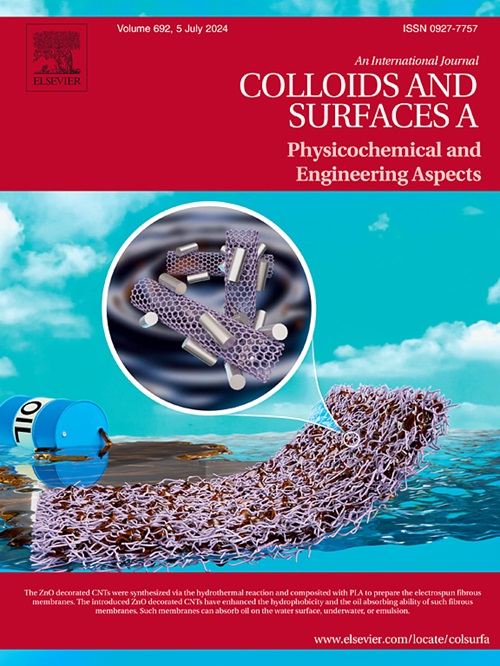水热合成花生壳碳点作为新型高效缓蚀剂的研究
IF 5.4
2区 化学
Q2 CHEMISTRY, PHYSICAL
Colloids and Surfaces A: Physicochemical and Engineering Aspects
Pub Date : 2025-09-30
DOI:10.1016/j.colsurfa.2025.138517
引用次数: 0
摘要
本研究报道了一种简单、环保的方法,用于制备花生壳碳点(PS-CDs),这是一种常见的农业废弃物。合成的PS-CDs对冷轧钢(CRS)在1.0 M HCl溶液中的腐蚀有显著的抑制作用。通过透射电镜(TEM)、x射线衍射(XRD)、光致发光光谱(PL)、紫外可见吸收光谱(UV-vis)和傅里叶变换红外光谱(FT-IR)等表征技术的结合,充分证实了PS-CDs的结构特征。失重测量表明,在30 °C下,添加50 mg L−1 PS-CDs,抑制效率高达92.37 %。PS-CDs在CRS表面的吸附行为遵循Langmuir单层吸附等温线。电化学测量进一步表明,PS-CDs作为混合型缓蚀剂,可以有效抑制阴极析氢反应和阳极金属溶解过程。表面分析表明,PS-CDs能在CRS表面强吸附形成保护膜,从而显著减轻酸致腐蚀。PS-CDs具有优异的缓蚀性能,加上其合成路线简单、环保,突显了其作为新型绿色缓蚀剂在工业应用中的巨大潜力。这也为花生壳资源的高价值利用提供了一条有前景的新途径。本文章由计算机程序翻译,如有差异,请以英文原文为准。
Hydrothermal synthesis of peanut shell-derived carbon dots as the novel efficient inhibitor for the corrosion of steel
In this study, a facile and environmentally friendly method was reported for the preparation of carbon dots derived from peanut shells (PS-CDs), a common agricultural waste materials. The synthesized PS-CDs exhibited remarkable effectiveness in inhibiting the corrosion of cold-rolled steel (CRS) in 1.0 M HCl solution. The structural features of PS-CDs were fully confirmed by a combination of characterization techniques, including transmission electron microscopy (TEM), X-ray diffraction (XRD), photoluminescence spectroscopy (PL), ultraviolet-visible absorption spectroscopy (UV–vis) and Fourier-transform infrared spectroscopy (FT-IR). Weight loss measurements revealed that, at 30 °C, the addition of 50 mg L−1 PS-CDs resulted in an inhibition efficiency as high as 92.37 %. The adsorption behavior of PS-CDs on the CRS surface was found to follow the Langmuir monolayer adsorption isotherm. Electrochemical measurements further demonstrated that PS-CDs acted as a mixed-type inhibitor, effectively suppressing both the cathodic hydrogen evolution reaction and the anodic metal dissolution process. Surface analyses indicated that PS-CDs could strongly adsorb onto the CRS surface to form a protective film, thereby significantly mitigating the acid-induced corrosion. The excellent inhibition performance of PS-CDs, combined with their eco-friendly and simple synthesis route, highlights their great potential as a novel green corrosion inhibitor for industrial applications. This also offers a novel promising pathway for the high-value utilization of peanut shell resources.
求助全文
通过发布文献求助,成功后即可免费获取论文全文。
去求助
来源期刊
CiteScore
8.70
自引率
9.60%
发文量
2421
审稿时长
56 days
期刊介绍:
Colloids and Surfaces A: Physicochemical and Engineering Aspects is an international journal devoted to the science underlying applications of colloids and interfacial phenomena.
The journal aims at publishing high quality research papers featuring new materials or new insights into the role of colloid and interface science in (for example) food, energy, minerals processing, pharmaceuticals or the environment.

 求助内容:
求助内容: 应助结果提醒方式:
应助结果提醒方式:


